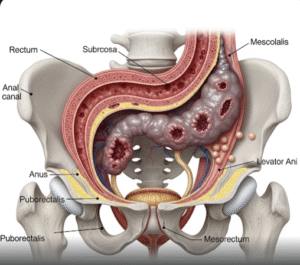Overview
Rectal bleeding refers to the presence of blood passed through the anus, usually visible in stool, on toilet paper, or in the toilet bowl. The blood can appear bright red, maroon, or black (tarry) depending on its source. While in many cases, rectal bleeding is caused by benign conditions such as hemorrhoids or anal fissures, it can also be a warning sign of serious diseases like colorectal cancer, inflammatory bowel disease (IBD), or gastrointestinal bleeding.
In Korea, with advanced diagnostic tools such as colonoscopy, capsule endoscopy, and CT angiography, rectal bleeding can be quickly evaluated to determine its cause and appropriate treatment.
➤ Can range from mild streaks of blood to large amounts of bleeding
➤ May indicate hemorrhoids, fissures, polyps, IBD, or cancer
➤ Requires urgent evaluation if heavy, recurrent, or accompanied by anemia
➤ Early detection in Korea helps identify colorectal cancer at a treatable stage
Key Facts
➤ Rectal bleeding is a symptom, not a disease, and the cause must be identified.
➤ Bright red blood usually suggests bleeding from the lower rectum or anus.
➤ Dark, tarry stools (melena) suggest bleeding from the upper gastrointestinal tract.
➤ Common benign causes include hemorrhoids, fissures, diverticulosis, polyps.
➤ In Korea, colorectal cancer screening is recommended from age 45 or earlier if at risk.
What is Rectal Bleeding?
Rectal bleeding is the passage of blood from the lower gastrointestinal (GI) tract. It may appear as:
- Bright red blood coating the stool or on toilet paper
- Maroon-colored stools from mid-intestinal bleeding
- Black tarry stools (melena) due to upper GI bleeding
It may occur occasionally or persistently and can range from mild streaks to life-threatening hemorrhage.
What Symptoms Are Related To
Rectal bleeding may be accompanied by other symptoms depending on the cause:
➤ Hemorrhoids / fissures: pain during bowel movements, itching, swelling
➤ Colorectal cancer / polyps: change in bowel habits, weight loss, fatigue, anemia
➤ Inflammatory bowel disease (IBD): abdominal pain, diarrhea, mucus in stool
➤ Diverticulosis / diverticulitis: sudden bleeding, abdominal cramps, fever
➤ Peptic ulcer or upper GI bleed: black tarry stools, nausea, vomiting blood
What Causes / Possible Causes
Rectal bleeding has many possible causes:
➤ Common benign causes
➤ Hemorrhoids (swollen rectal veins)
➤ Anal fissures (small tears in anal lining)
➤ Rectal prolapse
➤ Digestive tract conditions
➤ Colorectal polyps
➤ Diverticulosis or diverticulitis
➤ Ulcerative colitis or Crohn’s disease
➤ Serious causes
➤ Colorectal cancer
➤ Gastrointestinal bleeding from ulcers or vascular malformations
➤ Ischemic colitis (reduced blood flow to the colon)
When Should I See My Doctor
Seek immediate medical attention if you notice rectal bleeding in the following situations:
➤ Large amounts of blood or clots in stool
➤ Associated dizziness, fainting, rapid heartbeat (signs of major blood loss)
➤ Rectal bleeding with unexplained weight loss or fatigue
➤ Persistent or recurrent bleeding not improving with home care
➤ Black tarry stools (possible upper GI bleeding)
➤ Age over 40 with new rectal bleeding (rule out cancer)
Care and Treatment
Treatment depends on the cause, severity, and patient condition:
➤ Lifestyle & home care
➤ High-fiber diet to prevent constipation
➤ Adequate hydration
➤ Sitz baths for hemorrhoid relief
➤ Medical treatment
➤ Medications for hemorrhoids or fissures (ointments, suppositories)
➤ Antibiotics for diverticulitis
➤ Anti-inflammatory drugs or biologics for IBD
➤ Procedures & surgery
➤ Colonoscopy with polyp removal (polypectomy)
➤ Endoscopic cauterization or banding for bleeding vessels/hemorrhoids
➤ Surgery for severe cases, colorectal cancer, or recurrent diverticular bleeding
Treatment Options in Korea
Korea offers world-class diagnosis and treatment for rectal bleeding with a focus on early cancer detection and minimally invasive therapies:
➤ Advanced Diagnostics
➤ Colonoscopy with high-definition imaging and biopsy
➤ Capsule endoscopy for small intestine bleeding
➤ CT angiography for acute bleeding detection
➤ Minimally Invasive Treatments
➤ Hemorrhoid band ligation, laser therapy, and sclerotherapy
➤ Endoscopic mucosal resection (EMR) and endoscopic submucosal dissection (ESD) for early colorectal cancer and polyps
➤ Cancer Management
➤ Robotic and laparoscopic colorectal surgery
➤ Targeted chemotherapy and immunotherapy
➤ Precision radiation therapy (proton therapy available in major cancer centers)
➤ Leading Korean Hospitals
➤ Seoul National University Hospital – advanced colorectal cancer center
➤ Asan Medical Center – large-volume colorectal surgery and oncology unit
➤ Samsung Medical Center – expertise in endoscopic procedures and cancer care













